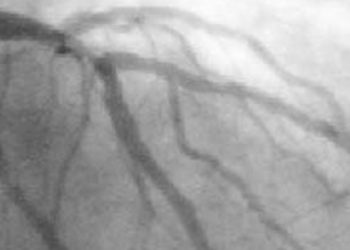#VisualAbstract: Risk of QT Interval Prolongation Associated With Use of Hydroxychloroquine With or Without Concomitant Azithromycin
1. Use of hydroxychloroquine with or without azithromycin to treat COVID-19 was frequently associated with QTc prolongation, with results being more pronounced for patients taking both hydroxychloroquine and azithromycin.
2. Likelihood of QTc prolongation was greater with concomitant usage of loop diuretics.
Evidence Rating: 2 (Good)
Although studies have found varying degrees of efficacy for hydroxychloroquine with or without azithromycin as a treatment option for COVID-19, the drug (combination) has gained significant traction worldwide and is one of the most common therapies used for affected patients. Though the drugs are generally well-tolerated amongst patients, both can cause corrected QT (QTc) prolongation, which should continue to be taken account in clinical practice despite the desperate search for effective treatment options. To better characterize the risk and degree of QTc prolongation in patients with COVID-19 associated with hydroxychloroquine and azithromycin usage, researchers performed a single-centre retrospective observational study consisting of 90 patients with laboratory confirmed COVID-19. The 90 patients included in the study received a standard regimen consisting of 400mg of hydroxychloroquine twice on the first day, followed by 400mg daily from days 2 through 5, and 53 patients additionally received azithromycin. Median baseline QTc reported was 455 milliseconds. Both groups were observed to have QT prolongation, at a median of 5.5 milliseconds and 23 milliseconds for the monotherapy and combinational therapy groups, respectively. Within a 4 week observation period, 21 of the 90 total patients (23%) had QTc prolongation of 60 milliseconds or greater, 11 of which had received azithromycin (21% of subgroup). Furthermore, the risk of QTc prolongation was also greater in patients who had received concomitant loop diuretics in addition to hydroxychloroquine, with significantly higher rates of patients having a QTc of 500 milliseconds or more (12 of 39 patients [31%] vs. 6 of 51 patients [12%]; P = .03). Though some studies may have found positive evidence for the application of hydroxychloroquine and azithromycin for the treatment of COVID-19, findings from the present study serve as a reminder for clinicians to continuing weighing the risks and benefits associated with drugs even in times of pandemic, and adopt strict QTc monitoring and vigilance for treatment cessation when necessary if they do decide to treat patients with the drug(s).
Click to read the study in JAMA Cardiology
©2020 2 Minute Medicine, Inc. All rights reserved. No works may be reproduced without expressed written consent from 2 Minute Medicine, Inc. Inquire about licensing here. No article should be construed as medical advice and is not intended as such by the authors or by 2 Minute Medicine, Inc.









